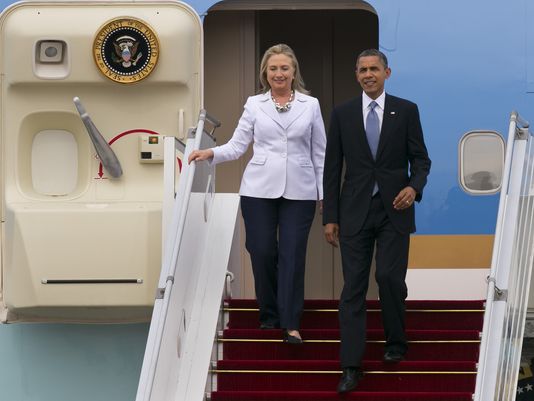Clinton won’t be using Obama’s playbook
< < Go Back
Both are groundbreaking politicians. And Democrats.
Beyond that, if Hillary Rodham Clinton runs for president in 2016, the differences between her campaign and Barack Obama’s in 2008 would be more striking than their similarities. Their strengths and weaknesses are in some ways polar opposites, and Clinton in 2016 would face a political landscape fundamentally different from the one Obama encountered in 2008.
Rival-turned-ally Clinton undoubtedly would have lessons to learn from Obama’s 2008 tactics, including the power of social media and the use of technology in tracking voters. But if she decides to run, his campaign won’t offer much of a template when it comes to strategy.
In some ways — she would be a candidate seeking a third term for her party while the incumbent president’s popularity is sagging — her task could be more like that faced by the Republican contender in 2008, Arizona Sen. John McCain.
“You’ve got obviously a very different political dynamic,” says Robert Gibbs, Obama’s chief spokesman during the 2008 campaign and his first term in the White House. “You’ve got Hillary Clinton running to replace another Democratic president. You don’t have the great foil of a Republican incumbent like George Bush that we had in the Obama campaign. And Hillary comes in as a completely known quantity. That’s both a positive and a negative.”
About this point before the 2008 campaign, in May 2006, 50% of those polled by Newsweek/Princeton Survey Research had never heard of Barack Obama. An additional 10% didn’t know enough about him to say whether they had a favorable or unfavorable impression of him.
In the latest NBC News/Wall Street Journal Poll, how many of those surveyed didn’t have an opinion of Hillary Clinton?
One percent.
Clinton’s long record and Obama’s short one didn’t work to her advantage in their battle for the Democratic presidential nomination in 2008. She was the familiar favorite of the party establishment; he was a fresh face who promised to change the way politics worked in Washington.
Eight years later, her résumé has only gotten longer. After continued frustrations with government gridlock, however, voters’ perspectives on that may have changed, says Democratic pollster Geoffrey Garin, a chief strategist in her 2008 campaign.
“The environment in 2016 is likely to be a much better one for her than the one she faced in 2007 and 2008,” Garin says. “People are more likely to put a premium on having enough experience to know how to get things done, how to make Washington work and work better. And they also want somebody who is going to be realistic about how things get done and how results get achieved. People appreciate that knowledge a little bit more than they did in 2008.”
That said, history illustrates how difficult it is for one party to hold the White House for a third consecutive term. In the past century, that’s happened only three times: In 1928 by Herbert Hoover, 1940 by Franklin Roosevelt and 1988 by George H.W. Bush.
More From USA Today:




